
New York Sea Grant’s 2024 John A. Knauss Marine Policy Fellowship Finalists: (left to right) Patrick Shea, Brianna Grimes, and Maximilian Brown.
— By Chris Gonzales, Freelance Science Writer, New York Sea Grant
UPDATE: In late October, NSGO announced the placements for the 2024 Knauss Fellows, including those from NYSG. The host offices are as follows: Two Executive Fellows — Maximillian Brown, NOAA's National Ocean Service, National Centers for Coastal Ocean Science; Brianna Grimes, Marine Mammal Commission; One Legislative Fellow — Patrick Shea, Office TBD
New York, NY, October 16, 2023 - New York Sea Grant (NYSG) congratulates three finalists in the 45th class of Sea Grant's John A. Knauss Marine Policy Fellowship (Knauss Fellowship). In the new year, among the fellowship program's 85 national finalists will be Patrick Shea, Brianna Grimes, and Maximilian Brown. All hail from universities in New York State — City University of New York (Brown and Shea) and Pace University (Grimes) — and hope to use their skills and experience in coastal science to promote marine conservation.
“Congratulations to the 2024 John A. Knauss Marine Policy Fellowship Finalists,” said Becky Shuford, director of NYSG. "New York Sea Grant is thrilled to introduce three amazing leaders from New York universities who will be bringing their expertise and enthusiasm to bear in the executive (Maximillian and Brianna) and legislative (Patrick) branches of the U.S. government."
Starting this fall, the three will join the other 2024 finalists from across the nation to virtually interview with federal offices that work on or have interest in coastal and marine science and policy issues. NYSG's finalists will be placed in federal government (legislative and executive) offices in Washington, D.C. for one-year fellowships that begin in February 2024.
“With skills, perspectives, and knowledge that range from molecular and cellular to the ecosystem level, and all three with local to global life experiences Max, Bri and Patrick are poised to be agents of change and make transformative impacts,” continued Shuford. “Each has a drive to cultivate coastal resilience, environmental awareness, and equitable action for all through inclusive community engagement, translation and communication of science into accessible information, and education to inspire people to become stewards of their marine and Great Lakes coasts and resources.
Please join me in enthusiastically welcoming Max, Bri, and Patrick to the Sea Grant family!”
NYSG’s 2024 Knauss Finalists: In Their Words
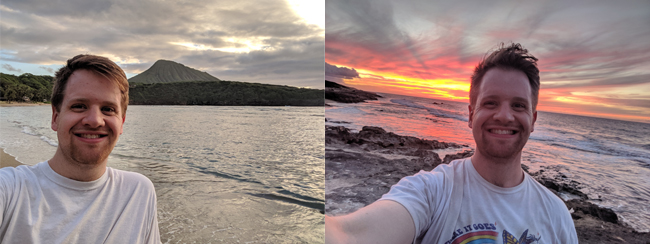
(At left) Patrick Shea stands on the beach of Hanauma Bay Nature Preserve in O'ahu, one of the island's more pristine ecosystems. "I'm interested to see how molecular ecology methods, such as environmental DNA (eDNA) metabarcoding, can be used to assess coral reef biodiversity across a range of anthropogenic pressure," says Shea; (At right) Patrick surveys for potential eDNA sampling sites near Ka'ena Point, on westernmost O'ahu. Credit: Deirdre Shea
Patrick Shea
The Graduate Center, City University of New York
Patrick Shea brings analytical and computational skills in database management, bioinformatics, geographical information systems, and remote sensing. His current doctoral research focuses on biodiversity assessment of Hawaiian coral reefs through environmental DNA (eDNA) analysis. He also has experience as part of a Yale Public Health Lyme disease study, in which he conducted antigen-screening blood draws and educated participants about ticks in green spaces. He says he hopes to become a marine conservation scientist.
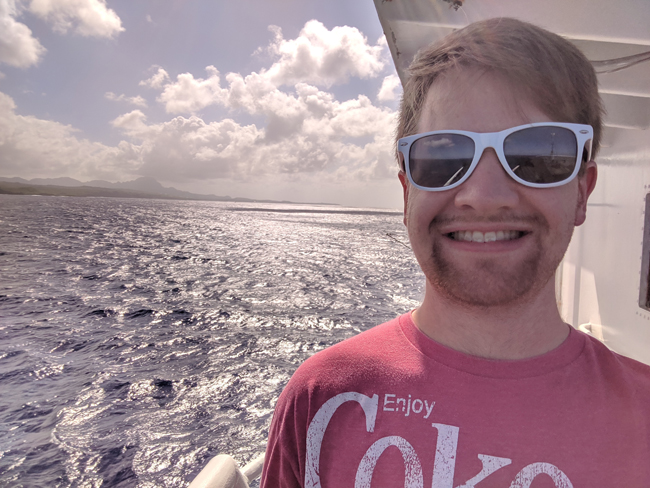
Patrick Shea spends time on a 2019 research cruise for NOAA Pacific Islands Fisheries Science Center's Reef Assessment and Monitoring Program. He was one of the data managers aboard the NOAA Ship Oscar Elton Sette, where fish, benthic, and oceanography science teams collected data from several Main and Northwestern Hawaiian Islands. Credit: Patrick Shea
"As a marine ecologist studying coral reef biodiversity through environmental DNA analysis, I'm excited to see how this new-age method can be incorporated and applied to federal policy for the management and sustainable use of marine resources," said Shea. "Also, given the 'big data' nature of these techniques, I am very interested to see how it can fit into education initiatives as well as international endeavors toward marine biodiversity conservation."
Brianna Grimes
Elisabeth Haub School of Law at Pace University
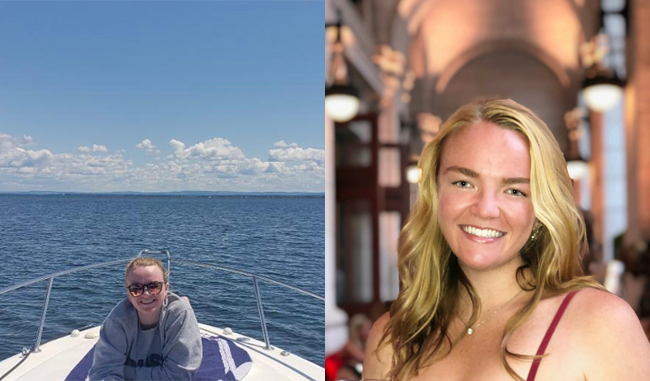
(At left) Brianna Grimes relaxes on her boat. Taken on Oneida Lake in upstate New York, her hometown; (At right) Brianna Grimes. Credit: Brianna Grimes
Since she was an undergrad, Grimes has followed a path that would enable her to become a steward for the animals: to protect them, advocate for them, and conserve their "homes." Her goal is to practice law with a specialization in ocean and coastal matters. She hopes to use her skills to contribute to legal and policy development with the aim of conserving and using resources sustainably. Throughout her education, she's worked a number of jobs, including restaurant jobs, and believes such experiences have strengthened her communication and teamwork.
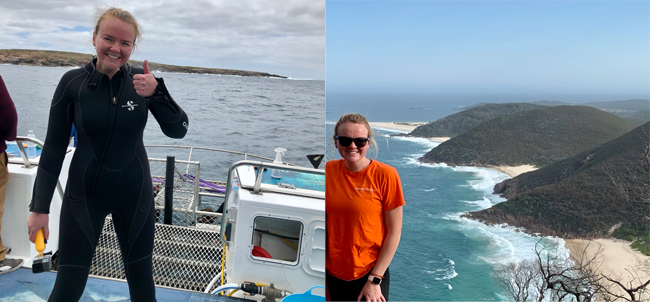
(At left) Brianna Grimes signals "good to go." Taken on a boat in Port Lincoln, South Australia, Australia before going cage diving with great white sharks; (At right) Hiking in Tomaree National Park in Nelson Bay, New South Wales, Australia. Credit: Brianna Grimes
"I am looking forward to the Knauss Fellowship because it will allow me to apply what I have learned studying environmental law to help shape marine policy and protect precious natural resources," said Grimes.
Maximilian Brown
The Graduate Center, City University of New York
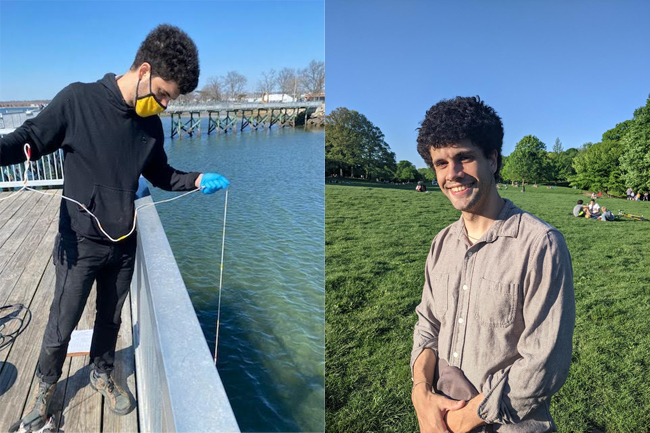
(At left) Max Brown collects water samples on the Long Island Sound at a shore site in Calf Pasture, CT; (At right) Max Brown. Credit: Max Brown
Maximilian Brown's master's research contributes to science-based management of the Long Island Sound. In this work, he has investigated the impact of nitrogen on different types of phytoplankton—tiny creatures that are the foundation of the marine food web. He's also focused on environmental awareness and advocated for renewable energy legislation. His long-term goal is to build sustainable environmental policy and decision-making. In his statement of objectives, he describes the need to get out of one's comfort zone to build effective teams.
"I am participating in the Knauss so I can contribute to building sustainable shorelines and infrastructure at the land water interface, particularly in cities, like my home in New York City," said Brown. "I think it is possible to have equitable access to ecologically-sound and healthy waterways."
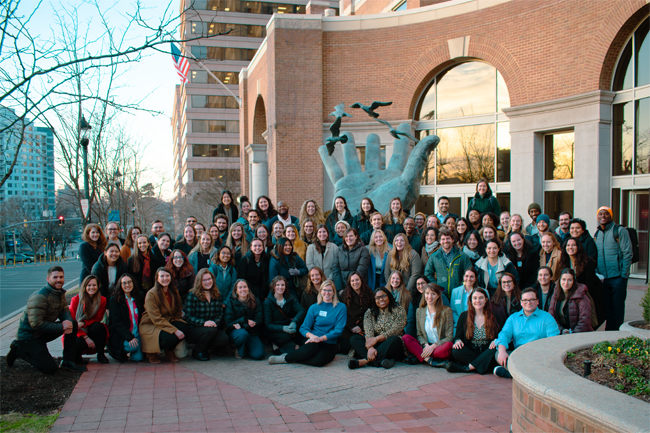
Pictured here are some 2023 fellows in the Sea Grant John A. Knauss Marine Policy Fellowship program. There are 85 finalists in the 2024 Knauss class. Learn about these talented early career professionals via the National Sea Grant College Program.
More Info: Knauss Fellowship
“Knauss fellows over the years have consistently and thoughtfully applied their unique knowledge and skill sets to developing solutions to issues that affect people across the nation,” said Jonathan Pennock, Director of the National Sea Grant College Program. “We look forward to welcoming the incoming class of fellows and have no doubt that they will continue the tradition of serving through science.”
The 2024 class features students and recent graduates from 66 universities, including 12 minority-serving institutions (MSIs). The 85 finalists represent 30 of the 34 Sea Grant programs across the country and have completed years of coursework in fields ranging from zoology, oceanography, and marine science to environmental management, public policy, and engineering.
Among the 82 fellows in the 2023 class of the Knauss Fellowship who secured placements in offices across NOAA and other federal agencies are four from New York —Lisa Crawford (Highly Migratory Species Management Division, Office of Sustainable Fisheries), Amelia-Juliette Demery (National Science Foundation Division of Ocean Sciences, Office of the Division Director), Noah Hunt (U.S. House of Representatives’ Science, Space, and Technology Committee; Environment), and Omisha Manglani (U.S. Senator Jeff Merkley’s Office (D-OR)).
Students enrolled in or have recently completed master’s, Juris Doctor (J.D.), and Doctor of Philosophy (Ph.D.) programs with a focus and/or interest in marine and coastal science, policy or management can apply to the John A. Knauss Marine Policy Fellowship Program via one of 34 state Sea Grant programs. Applicants who are successful at the state level advance, and their applications are reviewed by a national panel. You’ll find further details about the fellowship at www.seagrant.noaa.gov/Knauss and you can keep up with current and previous Knauss fellows from across the country at www.seagrant.noaa.gov/knauss-blog.
Since 1979, over 1,600 fellows have completed the one-year Knauss fellowship program, applying their experience to lasting careers in science, policy, and public administration. Learn all about the Knauss Fellowship in a video from the National Oceanic and Atmospheric Administration's National Sea Grant College Program: https://bit.ly/Knauss-video. The application period and guidance for 2025 fellowships is slated to open in Fall 2023.
More Info: New York Sea Grant
New York Sea Grant (NYSG), a cooperative program of Cornell University
and the State University of New York (SUNY), is one of 34 university-based
programs under the National Oceanic and Atmospheric Administration’s
National Sea Grant College Program.
Since 1971, NYSG has represented a statewide network of integrated
research, education and extension services promoting coastal community
economic vitality, environmental sustainability and citizen awareness
and understanding about the State’s marine and Great Lakes resources.
Through NYSG’s efforts, the combined talents of university scientists
and extension specialists help develop and transfer science-based
information to many coastal user groups—businesses and industries,
federal, state and local government decision-makers and agency managers,
educators, the media and the interested public.
The program maintains Great Lakes offices at Cornell University, SUNY
Buffalo, SUNY Oswego and the Wayne County Cooperative Extension office
in Newark. In the State's marine waters, NYSG has offices at Stony Brook
University and with Cornell Cooperative Extension of Nassau County on Long Island, Brooklyn College and Cornell Cooperative
Extension in NYC and Kingston in the Hudson Valley.
For updates on Sea Grant activities: www.nyseagrant.org has RSS, Facebook, Twitter, Instagram, and YouTube links. NYSG offers a free e-list sign up via www.nyseagrant.org/nycoastlines for its flagship publication, NY Coastlines/Currents, which is published quarterly.